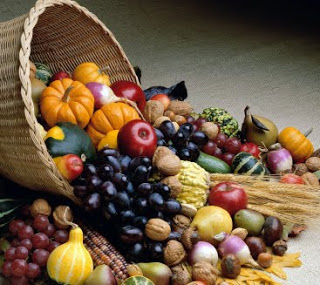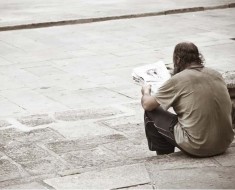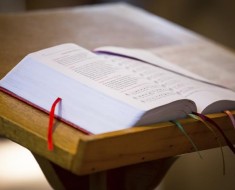 Bible Readings – Deuteronomy 26:1-11
Bible Readings – Deuteronomy 26:1-11
Psalm 19:1-6
Matthew 6:25-34
Introduction
Of all the things we are used to doing in traditional Church life, Harvest Festival must be amongst the most familiar. The meticulous arranging of vegetables, fruit and flowers, big tactical questions like who decorates the fount and who is responsible for the porch, what to do with everything afterwards – an auction to give money to the poor ( or the organ fund) or whether to take the comestibles to the nearest old people’s home.
The smell and the splendour as you come into church. The nostalgia is palpable, and nostalgia when it reminds us of our roots, of the good times of being church, of solidarity in faith is not to be despised. But nor is it to be indulged.
We celebrate this morning one of the most urgent, radical, most pagan of Christian festivals. It takes us to the fertile earth which distinguishes our planet from all the other planets and from which all our food comes and which determines whether animal and human life survives or goes under.
Let’s think about
our dependence on what God has provided;
our commitment as just stewards of creation;
the thankfulness that responds to God’s gifts;
the hope that Christian people hold high before the peoples of the world
1. Our dependence on what God has provided. Everything we have learned about what is happening to the earth and the environment – the way we have heedlessly plundered the planet and divided the world into the haves and the have – not’s, emphasises the tradition in both the Jewish and Christian religions, that everything we need is there, but has to be looked after, nurtured, cared for if we are to profit from it and live justly.
When we honour that, all is well. When we don’t, the survival of the fittest as well as the weakest is in peril.
Although the slick, selfish society that we have been pulled into may hide us from the truth, we are totally dependent on those few inches of soil that covers the rock and debris of the planet. Whatever vain glory we choose to parade about ourselves, it is all pretence. We are as dependent on the providence of God as are any of his creatures. As more primitive societies are economically forced to enter our commercialised and controlling culture, what they lose we have lost too.
Belief in God takes us to the basics; to the fields, the rivers, the sky and the stars, to our ultimate and utter dependence on the earth and on God the provider.
2. Our commitment as just stewards of creation. That means for Christians as for anybody who cares for the continuance and quality of life, that we are committed to doing everything we can to honour and maintain and make explicit that dependence. The old Noah story is about taking up the reins of responsibility again. Christian Stewardship was one of the rallying cries in English churches in the late sixties and seventies. Congregations were asked to think seriously about their giving of money and skill to strengthen the resources of churches first, and to serve the communities around them second. Often very successful they tended also to be parochial. Now we would want to reverse the priorities, communities first, church second. Today we live on a larger map.
I am not into high finance but suddenly we are all drawn into the world of banking, where bankers gamble with money entrusted to them, unable to see that there is a moral disconnection between trust and risk. The greed continues and politicians are complicit in their reluctance to resist it. Remedies are suggested but governments hesitate to act upon them. Although congregations have limited powers, we do have some. Power of example, power of identification, power of prayer, power of solidarity, power of conscience, power of the ballot box, power of protest and the power to commit ourselves to living openly, justly, for others and not only for ourselves.
3. The thankfulness with which we respond to God’s gifts. These are not good days for natural depressives – we are bombarded by bad news and by dire warnings of impending catastrophe on a daily basis. Global crises follow each other like skeletal spectres haunting us in a darkening world. Though often exaggerated, the brokenness of the world has to be taken seriously, but balanced by thankfulness at the sustaining mercies of God, for the joys of life, at the prodigality of his creation – imperilled by our misuse but never failing in its ceaseless stream of providential grace. ‘Come ye thankful people come’.
Here before and around us are the signs of his goodness, our worship our grateful response. Henry Alford’s hymn moves on from the fields and the grain to another symbolism. We are visualised as ‘ wholesome grain’, there will be a final harvesting of souls, a gathering ‘free from sorrow, free from sin. ‘Come with all thine angels come, Raise the glorious harvest-home.’ There is a direct theological statement here: and it is that God is good and God has created the good earth and our very lives can be the means of propagating and giving evidence for that truth.
4. The hope that Christians bear before the peoples of the world.
Today gives us the opportunity to remember that Christian people are realists. We have no illusions about the ability of human beings to muck things up; for them to be cruel, wicked and evil. But part of being realistic is to be positive about the options. The crucifixion of Jesus is constant reminder of our inhumanity; his resurrection is a constant promise of redemption. We will help no one if we go around with huge grins, slapping people on the back and saying ‘it’ll be alright one day’. Or ‘Jesus loves me’ so I’m alright and you can be too.’ But we do need to be amongst those who see the future as hopeful. In the world of faith there are always openings and opportunities. The causes we champion – truth from God, love from him shared between people, justice for the oppressed, relief for the impoverished, healing for the sick – these are never lost, for they are how God has made the world and how he sustains it.
One of the advantages of the series of global crises that we are rightly concerned about, is that they ARE global. The world is smaller than it was, more integrated and whereas many hold their hands high in despair, we don’t. Many of us are deeply concerned for Palestinians. I am a member of an organisation called Sabeel UK (The Way) that is supportive of Palestinian Christians and their search for a just settlement in that part of the Middle East and their constant prayer for it to happen. Concerned for the world of today we can get lost in despair; but we are also people of tomorrow. For though we may be called fools for Christ as St. Paul was, hope is not wishful thinking but an intimation of what can and must be. We hold that hope high before the peoples of the world, especially in situations which seem hopeless.
Conclusion
Remember Noah and his maritime adventures; a story of human failure and divine judgment. God is lord of every living creature, the animal and human and planetary world all belonging to the same order of life. The old story has a conclusion – ’the Lord said in his heart, ‘I will never again curse the ground because of humankind, for the inclination of the human heart is evil from youth; nor will I ever again destroy every living creature as I have done. As long as the earth endures, seedtime and harvest, cold and heat, summer and winter, day and night, shall not cease.’ And the confirmation of that promise was seen as a rainbow spreading across the sky – ‘a sign’ says the Lord ‘ of the covenant between me and you and every living creature of all flesh..’ Its such an evocative image that when we see a rainbow in the darkened sky we breathe a sigh of joy – ‘ it’s alright, it’s going to be alright’.
Harvest is a time for reflection but also for action. Churches have care for people in need, support programmes for alleviating such need; congregations are made up of people of conscience; and commitment. We can best honour the gathering of harvest by reviewing our responsibility to make some contribution to human betterment. It isn’t ‘up to us’ to change the world, but the invitation from God is to be part of the stream of enlightening and redeeming power that comes from him and is for everyone, especially those in greatest need. And comes through you.




